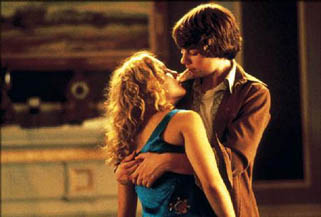Before Their Time: Almost Famous
By Daniel MacDonald
March 12, 2009
BoxOfficeProphets.com

Opening in the fall of 2000 and grossing just under $33 million domestically, with a reported production budget of $60 million, Almost Famous was clearly not financially successful in its theatrical run. While it has developed somewhat of a following on DVD, which is probably why Crowe continued to secure studio support for follow-up projects, it remains a movie that has never gotten its full due. Full to the brim with emotionally honest dialogue, and believable, unique situations, Almost Famous takes us on several journeys at once. By the time the credits roll, we feel as if we have been on tour with a hard rocking and popular band, we have witnessed a boy becoming a man, and we have developed a new appreciation for the live-wire spirit that was the American music scene in the 1970s.
There are a lot of places where Almost Famous could have gone horribly wrong, but somehow it never seems to take a wrong turn: Crowe successfully resisted the temptation to impose a classical storytelling structure on this real life odyssey, opting instead to let the messy realities of real life map out each character's arc, and for his trouble he earned a Best Original Screenplay Academy Award. The main character William Miller, played appropriately low-key by newcomer Patrick Fugit, could have easily fallen victim to the allure of drugs, alcohol, and easy women on the road, becoming a misguided jerk that the wise, father figure guitar player has to bring back to save from himself before he falls off the edge. Or William could have learned how to play an instrument, leading to a stand-up-and-cheer finale of him finally fulfilling the dream of playing with the band at Madison Square Garden, perhaps before tragically succumbing to cancer or getting hit by the tour bus. Time and again, we think we know where things must be going, and we are pleasantly surprised when our expectations are subverted. The pressure - to make it more dramatic, more mainstream, more overtly funny or sad - must have been intense, and the fact that it avoids the common cliches of its brethren is a large part of why Almost Famous feels like the product of a singular, unadulterated vision.
Despite his young age (he's 15 when he leaves to tour with the fictional group Stillwater, much to the chagrin of his intellectual worrywart mother, played with gusto by Frances McDormand) William ends up the most mature member of the touring cavalcade. Lead guitarist and emerging celebrity Russell Hammond, a career-launching role for Billy Crudup, is self-involved, self-indulgent, and selfish, requiring William's rescue more than once yet dismissive of the boy when he's not needed. Jeff Bebe, the band's lead singer played by Jason Lee, is insecure and hopelessly jealous of Russell's emerging popularity, letting his short temper threaten to destroy the group. And the object of William's affection, the ethereal free-spirit Penny Lane (Oscar nominee Kate Hudson), is so self-destructive that it's unclear whether she'll survive until the end of the film. By default, William's so much better adjusted than these folks, as he should be: raised in the suburbs, graduating from high school two years early as the product of a loving single-parent home, he is fortunate enough to chase his passion for rock journalism from a place of security.
It is William's normal, middle-class background that makes Almost Famous so accessible - rather than a collection of "inside baseball" trivia about the classic rock scene, appealing only to those who already have an interest in the subject, we can share in William's naivete and be shocked, thrilled, uneasy, and exhilarated right along with him. According to the excellent audio commentary (by Crowe and, improbably, his mother) on the must-see Untitled version of the film, nearly everything in Almost Famous is based, not only on fact, but on his Crowe's own life experiences; however, the incredulity of the situations are never as front and center as are the emotions of the main characters.
Almost Famous is, first and foremost, about people - people learning to live with each other and with themselves as they chase their dreams. It is the very definition of heartfelt, scenes ringing so true that they give goose bumps, and populated with people who seem to be strikingly well-rounded, living, breathing souls rather than necessities of plot. While Crowe's early films, for example Say Anything... and Singles, were fresh and memorable ("I gave her my heart and she gave me a pen."), and his later movies, like the much maligned Elizabethtown (a movie that may find its way to this column down the road), feature more quirky character-driven storytelling, I don't know how he'll ever manage another picture that is as complete an artistic success as Almost Famous.
There have been plenty of films made about the music industry, but sometimes they can feel like a standard template superimposed over a time and place, so that the music scene becomes little more than a setting for a conventional plot to play out (see the Jennifer Lopez/Marc Anthony drama El Cantante). Almost Famous is more than that - it is a rare film that is to be experienced rather than watched, taking the viewer by the hand and saying, "Trust me, you'll like where we're going."